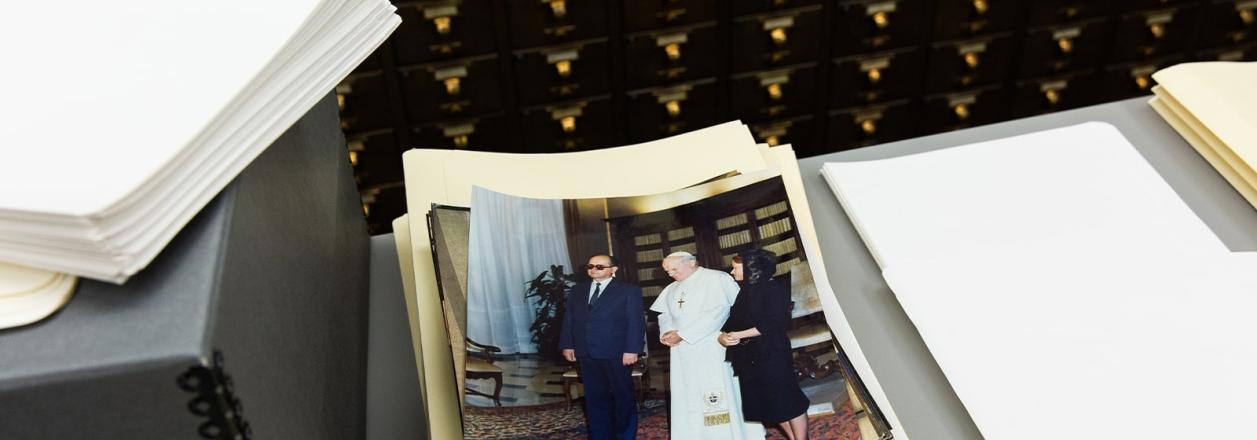Statement on Description Practices and Potentially Harmful Language
Background
The mission of the Hoover Institution Library & Archives is to collect, preserve, and make available the most important materials about global political, social, and economic change in the 20th and 21st centuries. Our collections include rare publications and primary source archival materials that relate to war, revolution, and peace. Our catalog records and archival finding aids serve an international community of scholars, as well as Stanford students and faculty. We believe that access to historical material in its original and unaltered form is a tenet of a free and open society.
In the pursuit of our founder’s mission to document the evils of war and safeguard peace, many of our materials reveal distressing truths about humanity’s recent past. In the words of Secretary Condoleezza Rice, director of the Hoover Institution:
As a renowned library and archives, we seek to preserve the historical record, thus tapping into experiences of the past – both those that are good and those that are troubling – to inform the future. We carry out our mission with the goal—stated by Herbert Hoover—of improving the human condition. (October 2020)
In addition to taking guidance from our institutional mission, the Hoover Institution Library & Archives' practices are also informed by the professional standards of the library and archival profession, including the Society of American Archivists and the American Library Association.
Our Materials
Our collections deal in subjects that encompass a broad range of human experiences, including tyranny, genocide, displacement, and political conflict. To engage with our materials is to acknowledge that one may encounter content that reflects racism, antisemitism, xenophobia, homophobia, sexism, and other forms of hatred and discrimination. In keeping with our mission, we believe that only through the retention and study of historical sources can the world hope to learn from its past mistakes and promote peace.
Our Description Practices
Our librarians and archivists contribute to a legacy of over one hundred years of descriptive content at the Hoover Institution Library & Archives. Because maintaining the historical integrity and context of our materials is a crucial archival practice, we do not censor historical documents. This means that we do not edit language or organization names when we transcribe original content, even if it is offensive or outdated. However, we do recognize that there is a difference between preserving original primary sources and retaining potentially harmful language in narrative content notes created by our staff.
We aim to provide archival description and descriptive metadata that is fair, inclusive, accurate, and respectful to those who use our materials and to the people and communities that they describe. While equitable description is our goal, descriptive metadata cannot be entirely neutral, nor can we be entirely neutral as stewards of these materials. Describing historical documents requires making description decisions regarding focus, emphasis, interpretation, and tone; it also requires making decisions regarding inclusion and exclusion. Lack of description can be another form of discrimination and partiality.
Librarians and archivists also use standardized vocabularies, which enhance researcher access to our collections and materials. Authoritative forms of names, subjects, uniform titles, geographic locations, historical events, and organizations facilitate consistency and the interoperability of records and databases. Although we are obligated to adhere to professional standards by using standardized vocabularies (especially the Library of Congress Subject Headings and the Library of Congress Name Authority File), these authority files inevitably contain terms that reflect the biases of the predominantly Anglo-American librarians who create and edit authority records.
We strive to be aware of our own biases, be thoughtful in our description practices, suggest edits to standardized vocabularies, and create new name authority records for people from underrepresented and marginalized communities and a variety of historical periods. Where we identify legacy descriptive content that is not fair, inclusive, accurate, or respectful, we seek to revise it with reparative description. We understand that ethical description is an ongoing process. We commit to continually improving our description practices and to do our best to provide the highest quality of descriptive content for researchers.
Feedback or Questions?
We welcome feedback from our researchers and our Stanford community. Please reach out to us with any feedback or questions if you encounter what you believe to be harmful or offensive language in the description of our archival collections or in our catalog records. Description practices and terminology, although reliant on professional community standards, must evolve over time and require ongoing evaluation. As part of our efforts to create ethical, effective, and accurate description, we welcome the input and participation of all.




